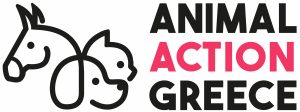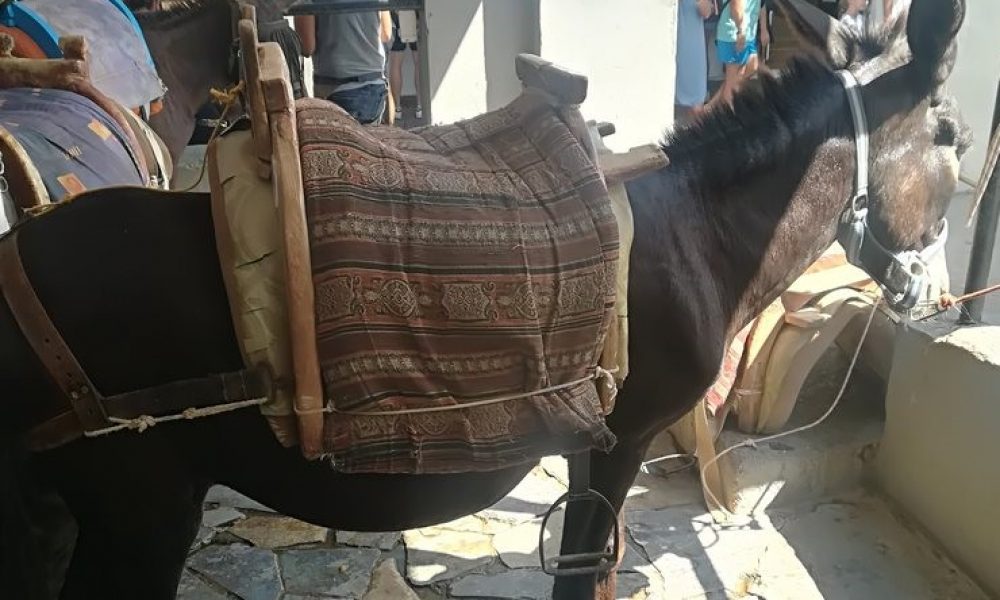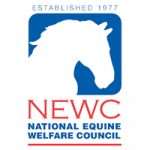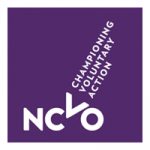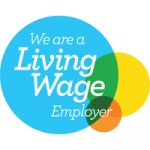This summer we received welfare complaints about the working donkeys in Lindos, Rhodes, and we have previously received requests from their owners to offer our advice, expertise and services to improve their conditions and achieve a better level of welfare. Our Equine Outreach team visited the island from 8th – 11th September and offered their services to 67 donkeys who transport tourists up to the Acropolis of Lindos. This is the main archeological site of Rhodes, with the 116-metre-high cliff dominating the town and overlooking the sea.
The donkey owners have set up the Lindos Donkey Association, which asked for our help to comply with the necessary measures for the wellbeing of their animals. Several improvements have been achieved, but there are still many more things that need to change. The donkeys in Lindos work from 8am until 5pm, having a maximum of 6 permitted routes, 10 minutes each, therefore a maximum working time of 60 minutes daily. The donkeys work in pairs and on alternative days, so they get time to rest at their stables between working days.
During our team’s 3-day visit, the donkeys examined were mainly medium size (estimated to weigh around 200 – 270kg), and were in ideal body condition, while some were found to be overweight. No wounds or injuries were observed and none of the donkeys were found to be lame. All the harnesses and saddle packs used were examined and none found to be inappropriate, most of the animals that our team examined were already microchipped (despite the lack at the time of the electronic registration platform from the Ministry), and all were vaccinated and dewormed. Just before our visit, we had asked the Donkey Association to replace all the unsuitable chain headcollars with cotton or leather ones; our recommendations had been followed by every owner, so it was pleasing to see none of the donkeys wearing an uncomfortable chain headcollar. On their first day, the team recommended the owners use fly fringes to prevent flies and insects irritating their eyes, and the next day the president of Lindos Donkey Association had already bought and distributed them to all the donkeys. Several donkeys were found to have some sores below their eyes due to irritation from flies, causing tears and streaming eyes which can inflame the skin. Our vet, Kostas, gave appropriate instructions to prevent this, applied healing and anti-parasitic ointment and fly fringes were immediately used with impressive results.
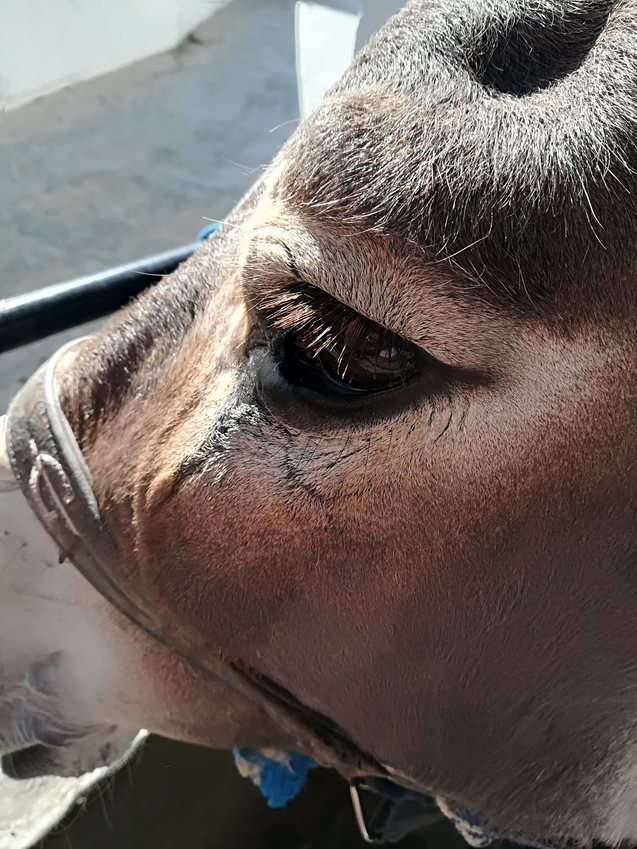
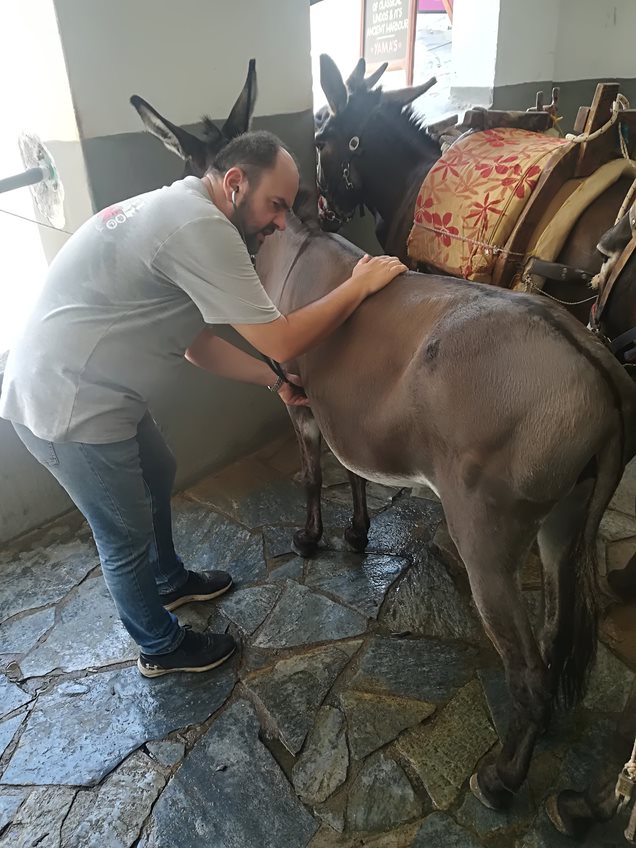
The starting area for the route to the Acropolis is permanently shaded, with a paved floor which is hosed and swept clean at regular intervals; there is fresh running water provided when they return from the route and at the second starting point at the beach. There are also buckets of water at the top of the route outside the Acropolis.
Most donkeys had normal shape and size hooves due to walking and natural wearing down, but increased moisture on their soles from the constantly wet floor can cause bacteria and fungi growth. For this reason, all their hooves were thoroughly cleaned by our farrier, and powder or – where appropriate – cream with copper sulfate was applied to reduce moisture, while instructions were given to owners to prevent the problem.
Finally, equine dental care was provided by our equine dental technician who rasped sharp enamel points, hooks, ramps and oversized teeth, while performing a general dental check-up on all animals.
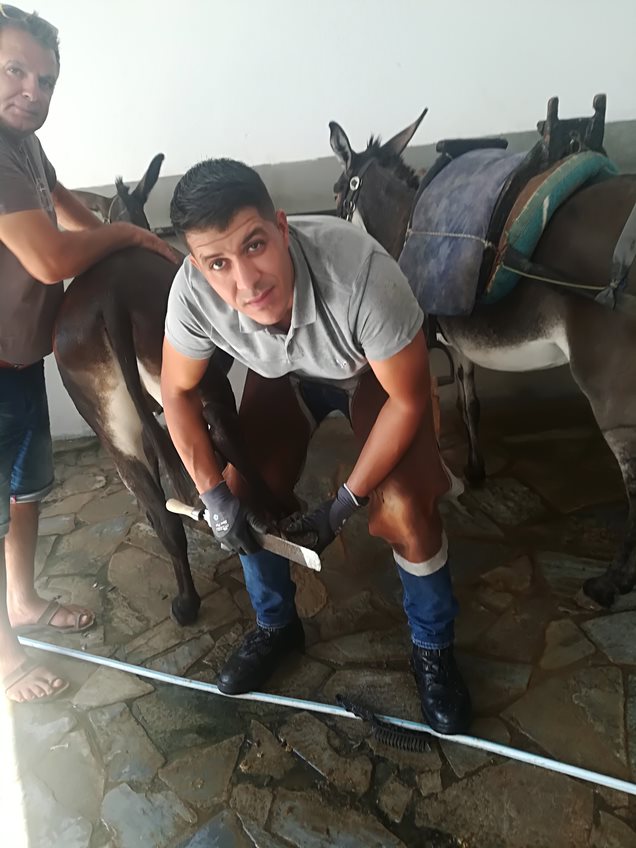
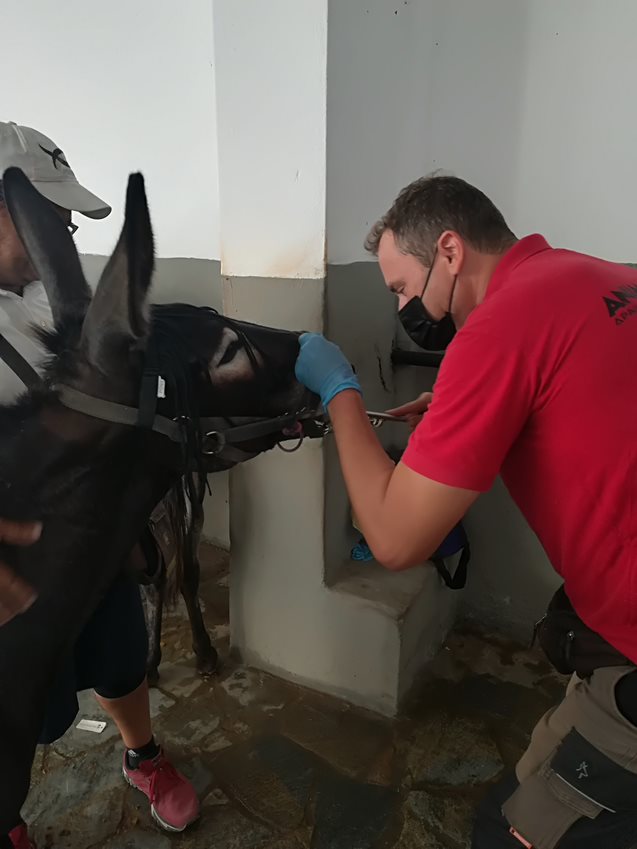
In general, with few exceptions, the team had very good cooperation with the owners, who asked them many questions about the care of their animals and readily accepted our suggestions.
Although there is supervision from members of the Lindos Donkey Association daily to check and enforce the weight limit, as well as punishment for those who do not follow the regulations, there are some less conscientious owners who continue to break the rules and escape surveillance. As a result, overweight tourists on small donkeys are still observed. This must be eliminated and the weight limit respected without exception by all owners. Although there is abundant shade at the starting point of the route for all donkeys, there is very limited shade outside Acropolis, and there is no shade at all at the second starting point (when there are many tourists), on the beach. The team noticed an accumulation of dung and a garbage bin very close to a waiting point for the donkeys, resulting in large numbers of flies; large parts of the road towards Acropolis and the returning road were also destroyed, making the passing of equines (and people) dangerous.
All these negative points were discussed with the president of the Lindos Donkey Association who acknowledged them and informed us of the owners’ intention to fully comply with whatever is required to have a higher level of animal welfare. With this visit, the foundations were laid for a future collaboration between Animal Action Greece and the Lindos Donkey Association, from which we hope that significant changes will result in improved welfare.
Our team visited the stables where the donkeys stay when they are not working; most of them met the basic principles regarding food, water and space for movement. Although the team noticed certain areas of shade both natural such as trees, and artificial such as shading tents, in almost all stables these were judged to be insufficient to protect the animals from the elements. The lack of sufficient shade was discussed in detail with the owners, who acknowledge this important problem and want to change the stable conditions to comply with these needs. The stabling and shading problem is a rather complex issue, that, as we were told by locals, needs to overcome the “barrier” of the Greek Archeological Service; it is a challenging issue that we come across in other parts of Greece as well.
Serious problems were found in two of the 13 stables visited during our visit, one extremely dirty with rubbish and dangerous metal sheets and wire and one with drinking buckets extremely dirty and unsuitable. Even though these two owners were found not to be members of the Lindos Donkey Association, the latter agreed to talk to them and help improve the situation.
Our team’s presence on the island proved to be very useful for a donkey which was not working due to its health problem, which the owner asked for our help with. The animal had been showing severe skin lesions on the neck and face with intense itching, his owner had sought veterinary attention and had applied several different treatments, with little improvement. Antiparasitic treatment was applied for ectoparasites, as flies were causing irritation and a detailed treatment protocol was written for the owner. The response to the treatment was very positive as the owner informed us after a few days the donkey is almost back to normal!
We would like to thank the President of the Lindos Donkey Association, Filippos Koliais, for his cooperation and help, before and during, the outreach trip. We are optimistic that in our next visits, we will cooperate directly with the local Municipality of Lindos, and the Municipality of Rhodes, to ensure the welfare needs discussed are met. The president of the Donkey Association wishes to work closely with Animal Action Greece, so that by following our recommendations and instructions, we can reach a high level of welfare for the donkeys. We have already seen the first positive examples of our cooperation and we hope to see many more. We now wait to see the improvements promised and will be in close cooperation with them, so that we can help achieve this goal.
